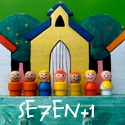Frugality, Riches and Contentment
In the town where John Adams grew up, his parents lived no differently from their ancestors. Their furnishings were 6 wooden chairs, a table, several beds, a looking glass, a Bible, and three silver spoons that were prized possessions.
“A hat would descend from father to son, and for fifty years make its regular appearance at meetings” (page 33, John Adams, excerpt from a letter).
Hard work and frugality were considered necessary virtues.
This seemed a personal challenge when I read it. In a culture where "new is better"and "more is better", people have ten times more resources than what their ancestors raised ten children with. Yet they belive they cannot afford children. They call themselves poor because they cannot afford the latest technology or a better car.
A while ago I decided on my own definition of riches: a roof over my head (owned, rented, or given), food, clothes, and some money to give away. To that I'd better add a good mattress and a good chair, without which I'd find it even more difficult to manage my back pain. With this definition, I'll probably be rich for life in Australia! In a commentary on Proverbs, David Hubbard argues that having enough to eat, clothes, and something to give, is God's definition of riches in Proverbs.
Whenever I'm tempted to say "I can't afford ___" or "I'm poor", I remind myself of my definition!
I also believe the Bible defines a godly partner and children as riches and gifts of God. So if I ever receive a godly husband and children, I'll be super rich!
The story of John Adams' family also reminds me to be content. It must have required great contentment in simplicity to continue with the same hat for 50 years. No need for excitement and change in the externals.
God also calls us to be content with our situation in life. So if God never gives me a husband or kids, or my own home, or a pain free back, or a trip around the world, I pray I'll accept and embrace what he does give. Each day, each hour, each moment, giving up my ideas of what life should be in exchange for the reality that he gives. As I've gone on in my Christian life, he has increasingly shown me how to do this. I used to be insecure and unhappy about being single, but now I rarely care. I used to grieve that my back kept me from so many things I longed to do, but now I am mainly content with what is possible. God has taught me to take more delight in what he has given, and in himself.
For perhaps the central quality of true riches is contentment. A simple stillness of soul, trusting God that whatever he brings is right. On that theme, an eighteenth-century w0man who called herself "A Poor Methodist Woman" wrote a poem that says it all:
when I have had happier times
in my soul
than when I have been sitting at work,
with nothing before me
but a candle and a white cloth
and hearing no sound
but that of my own breath;
with God in my soul
and heaven in my eye.
I rejoice in being exactly what I am
- a creature capable of loving God,
and who, as long as God lives,
must be happy.
I get up
and look a while out the window.
I gaze at the moon and stars,
the work of an Almighty Hand.
I think of the grandueur of the universe
and then sit down
and think myself
one of the happiest
beings in it.








